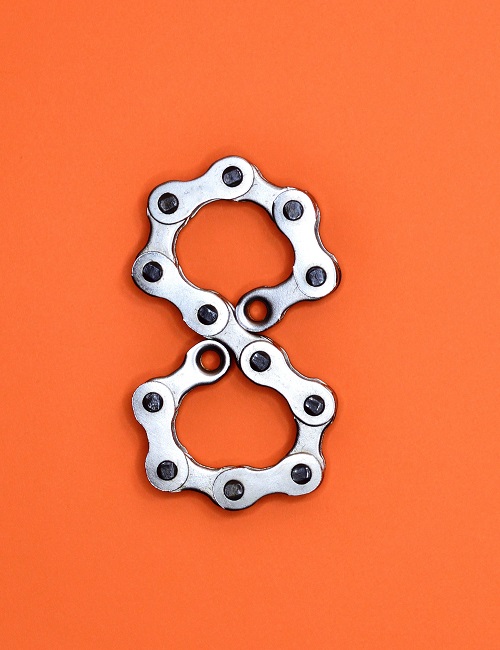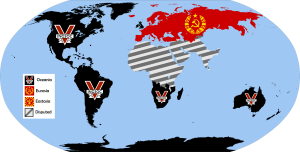I remember a time when I was sitting in my chemistry class and learned about electrons. These wondrous little marvels are apparently what all of science and study has boiled down to. The electrons that determine the properties of an atom are, as far as we can tell, the building blocks of life. Yes, one may call atoms the true building block, just as the foundations of a skyscraper are the building blocks for the structure itself, but electrons define atoms, just as the ground defines where the foundations of the structure are put in place. With electrons, one can expect to witness possibly any material in the world: one electron gives us hydrogen, while seventy-nine of the little miracles leave us with gold. And the properties don’t stop there: eleven electrons give us explosive sodium, while seventeen of them give us toxic chlorine. Yet, the combination of these elements produces salt, on which all known forms of life depend. Literally, anything can be created with these little, content, wonderful building blocks we call electrons.
And when did this wonder reveal itself to the world? Surely it was just as in the case of Leo Tolstoy’s War and Peace, a novel which, though first published over a century ago, is still famous across the globe for its brilliance. It only makes sense that something as great as the key to any object conceivable should have been celebrated for all of time itself. But that is not the case. In reality, J. J. Thompson did not discover electrons until 1897. What’s more, there were still some who refused to believe that the little particles even existed at all. Whether it was because of religious purposes, or an inability to comprehend the facts of life, some were simply so as to refuse to believe what is fact. Even more shocking than this reality is that, as far as anyone can tell, humans are the only being capable of realizing electrons. Whenever I spot an animal when riding my bicycle, or stroke the fur of one of my pet cats, I can’t help but think, what poor creatures these are, so dumb compared to us humans. Especially when one considers that they know not of the existence of electrons, one is appalled. To think that the overwhelming majority of known life forms do not know how life itself is created is a terrifying thought.
In today’s modern society, one can’t buy a food product without a nutrition label on it, or drink water originating from an unknown source. And yet, these organisms that know not of the presence of the very structure of all the universe go about their day-to-day lives as if nothing were missing from their routine. And perhaps that suits them: perhaps they are perfectly fine not knowing about the wonder that is the electron. But just as one who is in any way privileged is inconvenienced in the absence of such privileges, should ignorant organisms learn of elections, they could never again become so bland and unenlightened. That being stated, why do people wonder why things happen, instead of simply answering such questions with “electrons?” The meaning of life is something at the top of my concerns, and yet I know what it is. I know what it is for everybody, whether they like it or not. But let’s delve into some other considerations as well.
One of the most popular goals in life is to do as much as possible to be remembered after death. To make a mark that history cannot ignore and to live in the minds of the living used to be my ultimate purpose. Forget love: there is no proof that love means anything after both the loved, the lover, and anyone they affected are dead. Forget good or bad deeds, as well. Although some small actions can tremendously alter the course of history, in the very, very long run it will not matter to someone alive five hundred thousand years from now whether or not I helped someone gather their papers off the floor after they dropped them. Forget happiness: it matters not how happy one was during their life if they are already dead, for lack of proof to the contrary. Granted, I suppose that there is really no real proof that can yet define the possibility of life after death, but one can theorize. Now, do not misinterpret me – I enjoy being happy and try to do good deeds and love my family with all of my will, but remembrance is the only part of us that will prevail after death, or so I had once thought.
In actuality, however, all that will inevitably happen someday is that I will be forgotten, along with all of my accomplishments. I cannot write anything that will be remembered for all of time and my name will at some point or another be lost to the obscurity of countless fading records. Even those who have managed to be remembered for long periods of time (from Pliny the Elder to the dictator Nero), their time will come either now or later when they, too, are forgotten and known unto the empty void of forgetfulness where millions if not billions if not trillions already lie. It is like a graveyard of sorts, only one without names on the tombstones. These truths, this reality, led me to question life even further than most would be comfortable analyzing and even, for a time, to believe that life has no meaning whatsoever. But then I thought, “how could I seek a meaning without meaning?” For surely if there is a meaning, one of the countless individuals of history would have discovered it by now, and I am happy to say that I am one of those individuals. Now, do not think that I am some perfectionist lunatic who sees himself as right and everyone else as wrong, for I know not what people make of their lives morally. I suppose that my second goal in life, now, is to be remembered for as long as possible to the human mind (or any mind, for that matter), and I respect any other meaning of life that one may create (so long as it is not harming me or anyone else). But ultimately we are simply biding our time, doing what we happen to do in that short time between the date of our birth and the date of our death while we achieve the true, rational meaning of life: to gain eight electrons.
A quick lesson on chemistry: the periodic table is the organizer onto which all known elements are arranged, and they are arranged based on several factors, from atomic mass, to proton count, and, in many cases, electron count. Look at it like this: a hydrogen atom with no charge has one electron, and it comes first on the table. A helium atom with no charge has two electrons, and is second on the table, and thus the trend continues in this manner. And, as further proof that these elements are defined by electrons, their charges are determined by their amount of electrons compared to their number of protons. Therefore, without electrons, nothing can exist. So if all of everything that can be created occurred due to the happenings of electrons, then surely these electrons must react in some way. Well, I am not one to disappoint this time, as that is most definitely the case.
The periodic table is divided into rows and columns, the columns being referred to as groups or families. The elements in the first group, from hydrogen to francium, each hosts only one valence electron. The electrons of the second group, to the right of the first, from beryllium to radium, each contain two valence electrons. The next ten groups on the table are fairly stable and things don’t start to become interesting again until group thirteen is reached, which contains elements of three valence electrons. Then group fourteen with four, fifteen with five, sixteen with six, seventeen with seven, and eighteen with eight. These groups are so important that we have even given them names, and only those things that are important or dear to us are ever given names. Now, what do these electrons do on the periodic table? Well, because atoms of elements are mostly-stable if they achieve eight electrons in their outer electron shell, they will react accordingly. Francium, for instance, is in group one, meaning that it has only one valence electron, and therefore will do almost anything to get the other seven. Chlorine, in group seventeen, will do likewise because it contains seven of these electrons, and will react with many things to gain the last one it needs to become stable. Then there is the case of group eighteen – the noble gasses – called so because they have all eight valence electrons, and therefore do not need to react and so almost never do.
Electrons make up all matter and life forms in the cosmos, and therefore even we, as humans, are made up of electrons. That being said, if all electrons seek to be in shells of eight, and we are made of electrons, then our goal in life must be to achieve collections of eight. Everything that we do is for this goal: eating, breathing, drinking…It all reacts in a way that not only keeps us alive, but also gains or loses electrons according to the element’s relative stability. All of the other perceived meanings of life are simply side-effects of this end goal. Like oxygen is an essential byproduct of photosynthesis, happiness is a byproduct of love, love is a byproduct of life, life is a byproduct of eating, breathing, and drinking, and these are all the ways through which reactions take place. Life is a tool to achieve eight electrons. The only reason we have ambitions is because we were influenced by those before us, and they by those before them, and those before them, and so on, until it goes far back enough to the point when life was created in the first place, as a means to achieve eight electrons.
The answer then, to life, its meaning, the universe, and everything it contains, is eight electrons. The only reason you are able to read the words that you are reading right now, and the only reason I was able to write them, is eight electrons. And this is an answer that was long-sought-after. Just like people had once believed the Earth to be flat, and after discovering that it was round later discovered new continents. Even further into the future new galaxies were discovered. The same goes for the electron: first cells were discovered, then the first periodic table established, and then the electron discovered. We have finally reached the point where we can learn no more: the answer is clear, and clear it will remain. Eight electrons, that is the answer to your question.






Be First to Comment